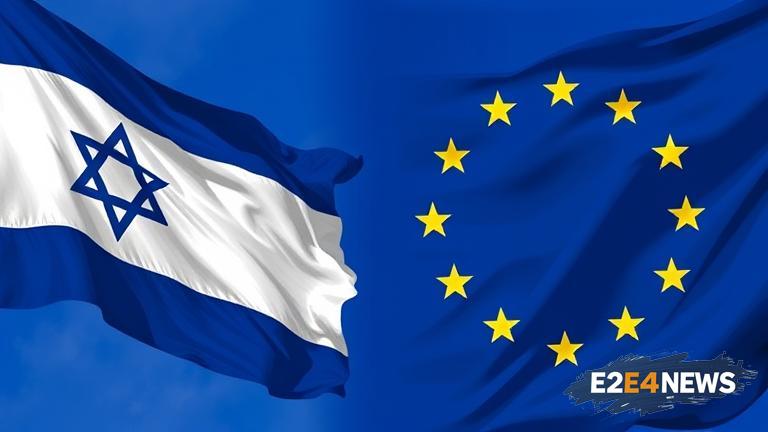The European Union has long been a vocal critic of Israel, often condemning the country for its actions in the Middle East. However, a closer examination of the EU’s policies and actions reveals a disturbing pattern of hypocrisy. While the EU is quick to condemn Israel for its treatment of Palestinians, it turns a blind eye to similar issues in other countries. For instance, the EU has been criticized for its handling of the migrant crisis, with many accusing the bloc of ignoring the plight of refugees and asylum seekers. Meanwhile, the EU has been vocal in its criticism of Israel’s border control policies, despite the fact that many EU member states have implemented similar measures to control their own borders. The EU’s hypocrisy on Israel is not limited to its border control policies. The bloc has also been accused of applying double standards to Israel when it comes to issues such as human rights and international law. While the EU is quick to condemn Israel for alleged human rights abuses, it has been slow to criticize other countries for similar abuses. For example, the EU has been criticized for its response to the Rohingya crisis in Myanmar, with many accusing the bloc of failing to take adequate action to address the humanitarian crisis. Similarly, the EU has been accused of ignoring human rights abuses in countries such as Saudi Arabia and China, while continuing to criticize Israel for its actions in the Middle East. The EU’s hypocrisy on Israel is also evident in its approach to the Israeli-Palestinian conflict. While the EU has been vocal in its support for a two-state solution, it has been slow to criticize Palestinian leaders for their role in the conflict. For instance, the EU has been accused of ignoring Palestinian incitement and terrorism, while continuing to condemn Israel for its actions in response to these threats. The EU’s double standards on Israel are not only hypocritical, but they also undermine the bloc’s credibility as a global actor. By applying different standards to Israel than it does to other countries, the EU undermines its ability to promote human rights and international law around the world. Furthermore, the EU’s hypocrisy on Israel also has real-world consequences, including the perpetuation of anti-Semitism and the undermining of efforts to achieve a peaceful resolution to the Israeli-Palestinian conflict. In recent years, there has been a surge in anti-Semitic attacks across Europe, with many of these attacks being fueled by anti-Israel sentiment. The EU’s hypocrisy on Israel has contributed to this surge, as it has created a climate in which anti-Israel sentiment is tolerated and even encouraged. To address this issue, the EU must take a more balanced approach to the Israeli-Palestinian conflict, one that recognizes the rights and responsibilities of both Israelis and Palestinians. This includes condemning Palestinian incitement and terrorism, while also criticizing Israel for its actions in response to these threats. The EU must also take a more consistent approach to human rights and international law, one that applies the same standards to all countries, regardless of their relationship with the EU. By taking a more balanced and consistent approach, the EU can help to promote peace and stability in the Middle East, while also upholding its values of human rights and international law. The EU’s hypocrisy on Israel is a complex issue, one that requires a nuanced and multifaceted approach. However, by recognizing the EU’s double standards and taking steps to address them, the bloc can help to promote a more just and peaceful world. The EU’s stance on Israel is not only a matter of foreign policy, but also a reflection of the bloc’s values and principles. By applying double standards to Israel, the EU undermines its own credibility and legitimacy, while also perpetuating anti-Semitism and undermining efforts to achieve a peaceful resolution to the Israeli-Palestinian conflict. In conclusion, the EU’s hypocrisy on Israel is a serious issue that requires immediate attention and action. By taking a more balanced and consistent approach to the Israeli-Palestinian conflict, the EU can help to promote peace and stability in the Middle East, while also upholding its values of human rights and international law. The EU must recognize the rights and responsibilities of both Israelis and Palestinians, and take a more nuanced and multifaceted approach to the conflict. Only by doing so can the EU hope to promote a more just and peaceful world, one that is free from the scourge of anti-Semitism and the perpetuation of human rights abuses.





